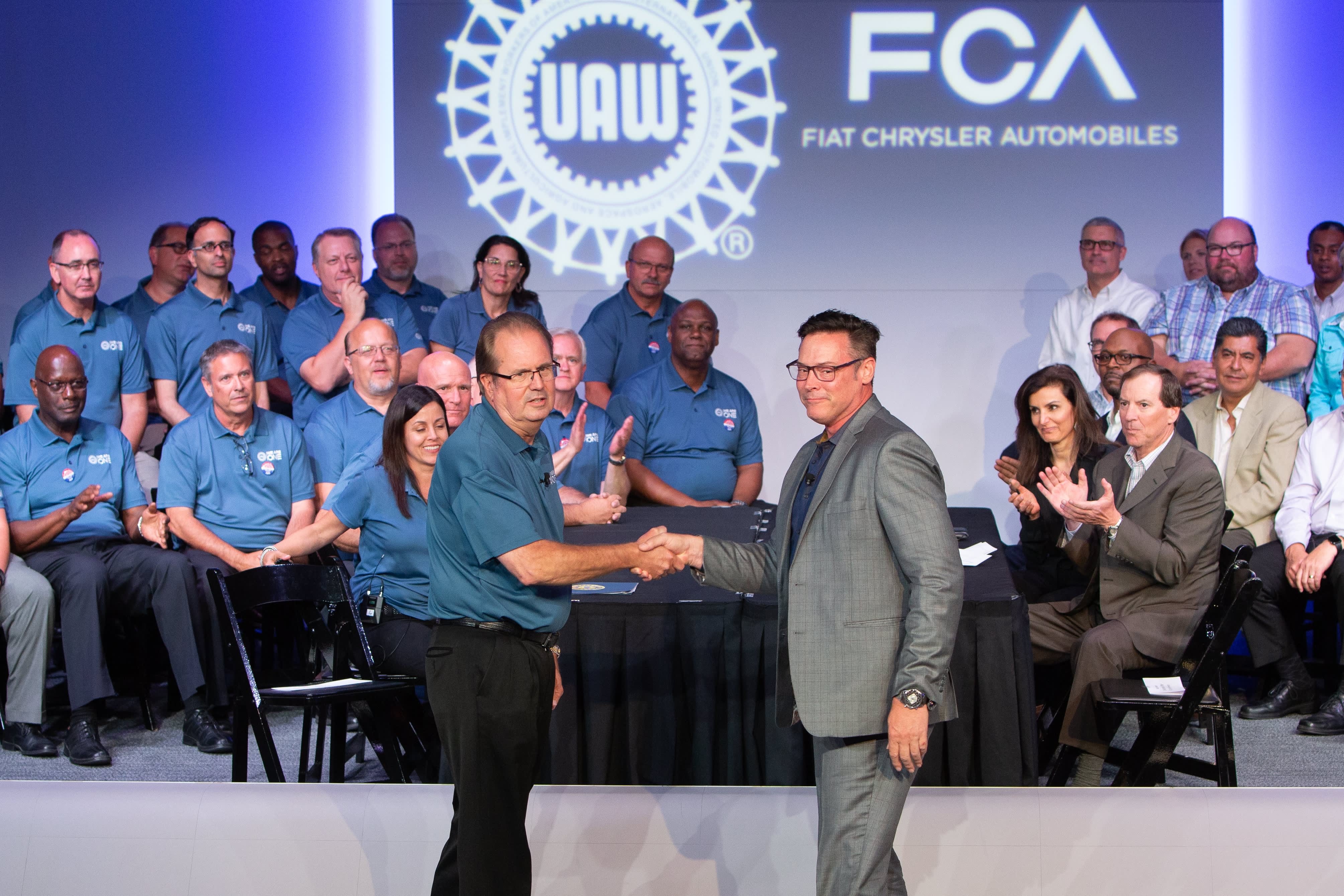UAW President Gary Jones (left) and FCA North America Chief Operating Officer Mark Stewart opened 2019 contract talks with a ceremonial hand shake during an event on July 16, 2019 at the company's North American headquarters in Auburn Hills, Mich.
Fiat Chrysler
DETROIT — The 2019 labor negotiations between the United Auto Workers and Detroit automakers ended Wednesday with rank-and-file workers at Fiat Chrysler approving a new four-year deal with the company.
Fiat Chrysler was the last of the three carmakers to close its contract with the union. The approval caps off an unprecedented round of negotiations that included a 40-day strike against General Motors — the UAW's longest national strike in decades — and the resignation of the union's president amid an ongoing federal corruption investigation.
The talks were also marked by a lawsuit GM lobbed at Fiat Chrysler over alleged corrupt bargaining practices as well as the planned merger between Fiat Chrysler and French automaker PSA Group.
"There's been more drama than I've ever seen before. That's for sure," said Colin Lightbody, a labor consultant and longtime negotiator for Fiat Chrysler.
Overall, the Detroit automakers retained much of the flexibility they gained in recent contract negotiations but were unable to make much, if any, ground on ballooning health-care costs and temporary workers. The union secured $18.2 billion in new investments in plants and the creation or retention of 25,400 U.S. jobs through the next four years. It allowed the closures of a handful of plants.
The negotiations between the UAW and GM were by far the most contentious. GM workers went on strike, and the company closed three plants. However, officials say Fiat Chrysler will likely see the biggest increase in labor costs due to its number of newer hires, also known as in-progression workers, that received significant gains as part of the pacts.
"Looking back, I think for the Fiat Chrysler negotiations, it's going to be looking for a rainbow in a bunch of different storms," said Art Wheaton, a labor professor at the Worker Institute at Cornell University, referring to the drama surrounding the talks that eventually led to "a very reasonable contract."
The union on Wednesday said 71% of its members with Fiat Chrysler who voted supported the deal. That compares with 57% in support at GM and 56% at Ford.
Investments, jobs
Fiat Chrysler's contract included the Italian-American automaker investing $9 billion in its U.S. manufacturing, including $4.5 billion in previously announced investments, and the creation or retention of 7,900 U.S. jobs over the life of the deal.
Under Fiat Chrysler's new contract with the union, in-progression workers will receive the same health-care benefits as veteran workers. That puts those workers more in line with their counterparts at GM and Ford.
Mary Barra, chairman and chief executive officer of General Motors Co. (GM), right, and Gary Jones, president of the United Auto Workers (UAW), shake hands during a GM event at the Renaissance Center in Detroit, Michigan, U.S., on Tuesday, July 16, 2019.
Jeff Kowalsky | Bloomberg | Getty Images
The deal, which was patterned off ratified deals with GM and Ford Motor, also includes $9,000 ratification bonuses, which match the bonuses of Ford workers but are $2,000 less than what GM workers received.
GM agreed to invest $7.7 billion in its current plants and to add or retain 9,000 jobs, while Ford's deal included $6 billion in investments and 8,500 new or retained jobs.
Missteps
GM, according to Wheaton, made the gravest missteps by announcing the potential plant closures in November 2018 and abruptly taking away, and then returning, health-care benefits of workers on strike.
"Their missteps resulted in a strike that was fortunately resolved with the membership getting a decent amount of return from the strike," Wheaton said.
GM expects the strike to have cost it about $3.8 billion to $4 billion for the year in earnings before interest and taxes, including $1 billion for the third quarter.
United Auto Workers members with General Motors picket outside of one of the automaker's truck plants in Flint, Mich. on Sept. 16. The union called a strike against the automaker after a deal was not reached by a Saturday night deadline.
Michael Wayland / CNBC
Lightbody also expects GM and its crosstown rivals to likely regret backing down on plans to curtail rising health-care costs during this year's negotiations — a major goal for the automakers at the beginning of the talks.
"I'm still very concerned about the long-term labor cost competitiveness of the Detroit 3 automakers," he said. "They did nothing to mitigate rising health-care costs. I think that's going to come back and haunt them."
The UAW, Lightbody said, also "totally missed the boat" regarding job security and benefits for newer hires in the event of a potential downturn. Instead, he said, they pushed for a shorter grow-in period for the workers to reach top wages.
